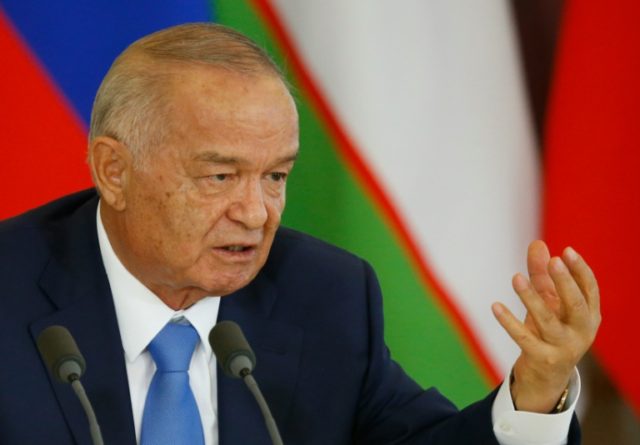Moscow (AFP) – Uzbek President Islam Karimov was in critical condition after a stroke, authorities said Friday, as claims mounted that he had already died with no clear successor lined up.
Speculation that more than 25 years of Karimov’s iron-fisted domination might be nearing its end has swept the tightly-controlled Central Asian nation since Sunday when officials said he had been hospitalised, with foreign-based opposition media claiming he was already dead.
Rumours over his fate were further inflamed when both Turkey’s prime minister and the president of ex-Soviet Georgia on Friday separately announced Karimov’s death and extended their official condolences.
Official details of Karimov’s condition were laid out on Friday in a statement posted on an Uzbek government website.
“Dear compatriots, it is with a very heavy heart that we inform you that yesterday the condition of our president deteriorated sharply and, according to doctors, it is evaluated as critical,” it said.
The terse announcement — also carried by state newspapers and television on Friday — confirmed officially for the first time that Karimov, 78, had suffered a stroke last Saturday.
The veteran leader’s youngest daughter Lola Karimova-Tillyaeva had on Monday announced on social media that he was in intensive care after a cerebral haemorrhage, describing his condition as “stable”.
Two days later, she hinted he was making a recovery.
The opposition Ferghana news agency, which is based in Russia, on Thursday said preparations were under way for Karimov’s funeral in Samarkand, his hometown, with streets being cleaned and parts of the city centre cordoned off.
The city’s international airport was to be closed to all but officially permitted flights Saturday, aviation authorities told AFP.
A diplomatic source in neighbouring Tajikistan said President Emomali Rahmon was to fly to Uzbekistan on Saturday, without saying where he was heading or why.
Kremlin spokesman Dmitry Peskov said that former Soviet master Moscow had “no news” on Karimov’s possible death and was waiting for official information.
– Power struggle? –
Long lambasted by rights groups for brutally crushing dissent, Karimov has ruled landlocked Uzbekistan since before it gained independence from the Soviet Union in 1991.
The strongman has portrayed himself as a bulwark against radical Islam on the borders of Afghanistan, stamping out fundamentalist groups at home.
Despite persistent claims over his health in recent years, Karimov has not left any clear successor — with some now speculating that senior regime insiders have started jostling to take his place.
In theory, the head of the senate, Nigmatulla Yuldashev, should step in until elections can be held if Karimov dies or is incapable of ruling but analysts have dismissed him as a water-carrier.
Instead, the frontrunners to take over long term are believed to be Prime Minister Shavkat Mirziyoyev, known as a tough-guy enforcer, and Deputy Prime Minister Rustam Azimov.
The country’s powerful security chief Rustam Inoyatov, who has held the post since 1995 and is seen as a key player behind-the-scenes, is already 72 and has a reputation tainted by violent suppression of protesters.
Amnesty International (AI) said Karimov’s death would mark “the end of an era in Uzbekistan, but almost certainly not of the pattern of grave human rights abuses.”
“His successor is likely to come from Karimov’s closest circle, where dissenting minds have never been tolerated,” AI’s Denis Krivosheev said.
Karimov’s elder daughter Gulnara, a flamboyant figure formerly seen as a potential heir, has dropped out of the running after she was placed under house arrest in 2014.
The socialite business magnate fell from grace after a bitter family feud burst into the open as she accused her mother and younger sister of sorcery, compared her father to Stalin and assailed Inoyatov on Twitter for corruption and harbouring presidential ambitions.
Born on January 30, 1938, Karimov was raised in an orphanage in the ancient city of Samarkand, before studying mechanical engineering and economics and rising up Communist Party ranks to become head of Soviet Uzbekistan in 1989.
– Rights abuses –
His regime has repeatedly been accused of heinous rights abuses — including torturing opponents and using forced mass labour in the lucrative cotton industry.
Most seriously, the authorities have been accused of killing hundreds of protesters in the eastern city of Andijan in 2005.
In the wake of international criticism over the alleged massacre, which Karimov’s regime rebuffed, Tashkent shut down a US military base used to supply operations in neighbouring Afghanistan since 2001.
But the wily veteran has played Russia, China and the West against each other to keep Uzbekistan from total isolation and continues to receive limited US aid.
Despite economic growth figures of some eight percent, critics say that Uzbekistan’s economy is in a dire situation with a corrupt elite in control of most of its industry.

COMMENTS
Please let us know if you're having issues with commenting.